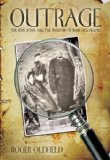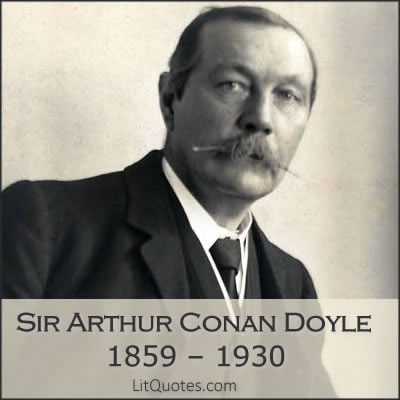 Arthur Conan Doyle didn’t just write mysteries, he actually solved a few. One of his most famous cases is the George Edalji case.
Arthur Conan Doyle didn’t just write mysteries, he actually solved a few. One of his most famous cases is the George Edalji case.
Roger Oldfield has written a book about the case, Outrage: The Edalji Five and the Shadow of Sherlock Holmes. Mr. Oldfield brings a unique perspective to the case as someone who has met descendents of individuals involved in the case. He’s also familiar with the area where the case took place.
Roger Oldfield recently told LitQuotes this about the case and about his new book:

‘SHERLOCK HOLMES AT WORK’. This was the headline in the Daily Telegraph on January 11 1907 when Sir Arthur Conan Doyle in the first of two articles announced to the world that he was taking up the case of George Edalji. The great novelist George Meredith, one of the many literary friends who wrote to congratulate him, put it this way: Sherlock Holmes, he said, had shown ‘what can be done in the life of breath’.
There had already been a national outcry in 1903 when George Edalji of Great Wyrley in Staffordshire had been convicted of wounding a pony, the 8th of a series of barbarous outrages against animals in his home village. The fact however that the very creator of Sherlock Holmes seemed in 1907 to be acting out the part of his own creation, the most famous character in British fiction, gave George Edalji’s cause worldwide fame: newspapers from New York to Paris to Mumbai reported the developing events of 1907 with fascination. Conan Doyle not only acted as sleuth, scouring the scene of the crime and interviewing the major players; he also had his real-life Inspector Lestrade as adversary, in the shape of George Anson, Chief Constable of Staffordshire, whom he blamed for George Edalji’s wrongful conviction.
The shadow of Sherlock Holmes has hung over the story every since. ‘It is a blot upon the record of English Justice,’ Conan Doyle wrote in his Memories and Adventures in 1924, ‘and even now it should be wiped out.’ This was the verdict which echoed for decades through the pens of many of the dozens of his admirers and biographers – ‘a very gentle, perfect knight (Lamond, 1931), a ‘brilliant vindication of Edalji’ (Pemberton, 1936), ‘the incarnation of the English conscience’ (Nordon, 1968). Even Julian Barnes, who has revived worldwide interest in the story in his novel Arthur & George (2005), the bookies’ favourite for the top literary prize in Britain in 2005, does not question Conan Doyle’s view that Edalji was innocent.
There is evidence, however, which runs counter to the Conan Doyle view, as the local historian Michael Harley suggested in the 1980s. Roger Oldfield’s book Outrage: The Edalji Five and the Shadow of Sherlock Holmes, Vanguard Press, 2010, is the first to go behind the scenes and assess the evidence for and against George Edalji in full. A conclusion is reached on whether the man who believed in fairies had been taken in by the mild-mannered, middle class myopic from Great Wyrley. As for Julian Barnes’s novel, that too is subjected to rigorous scrutiny and the general reader is given a glimpse into how far it remains true to the actual historical record.
Also new, and of special interest for Conan Doyle addicts, is an account of the extraordinary secret war which broke out between Conan Doyle and Chief Constable Anson. At one point their furious dispute led each of them to appeal to Winston Churchill for support. Anson was utterly contemptuous of the detective skills of the man many thought actually was Sherlock Holmes, and his seething hatred for the world-famous writer lasted until his death.
Roger Oldfield’s book suggests that the shadow of Sherlock Holmes hanging over the story has obscured the fascinating history of the Edalji family as a whole. His research has uncovered a mass of new material about all five members of the family which has never been published before.
For full details of the book see www.outrage-rogeroldfield.co.uk
‘unlikely to be surpassed as a comprehensive, intelligent, balanced and intensely readable account’ ~ The Newsletter of the Sherlock Holmes Society of London
‘certainly the best thing there is concerning the Edalji case on every count’ ~ D. Michael Risinger, Professor of Law, Newark, USA.


